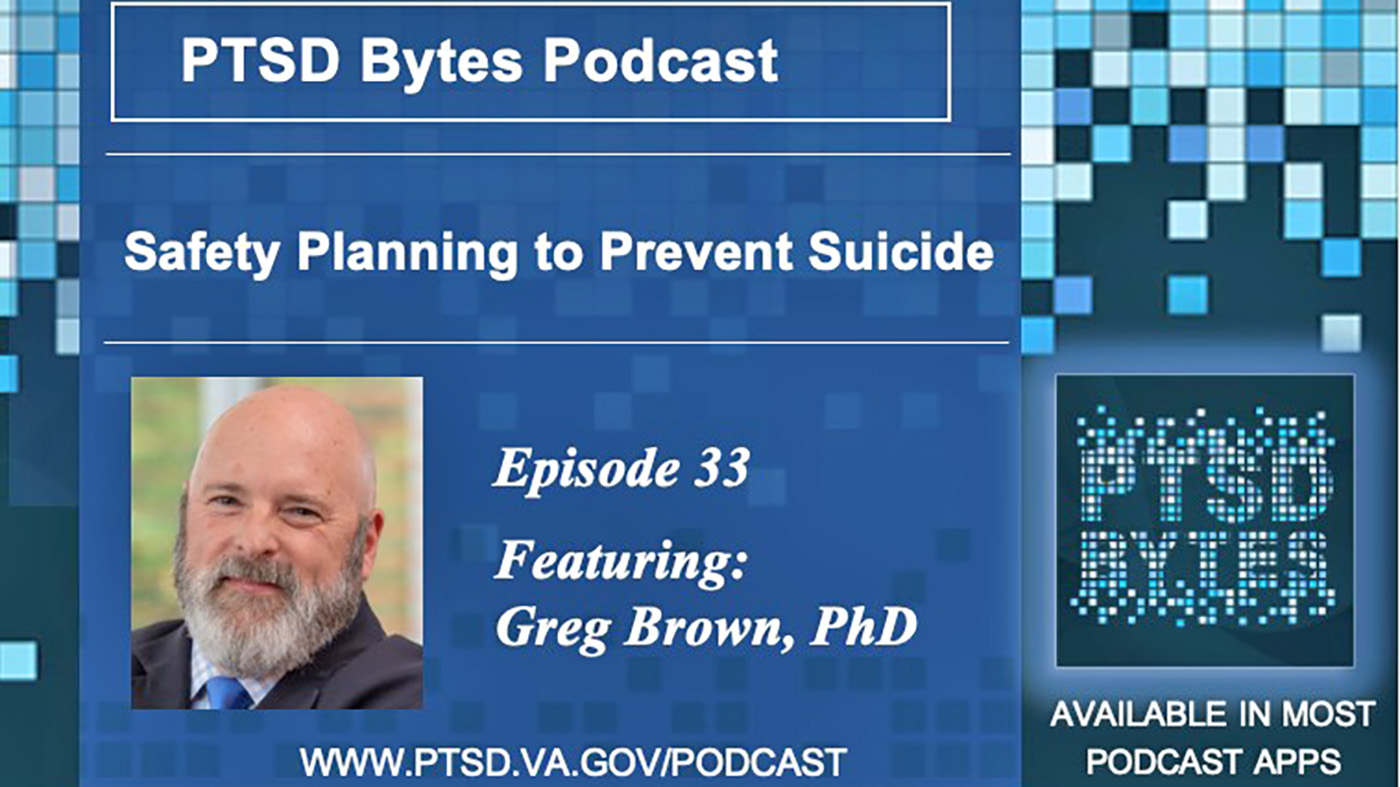In this episode of the PTSD Bytes podcast, host Dr. Colleen Becket-Davenport speaks with Dr. Greg Brown, a clinical psychologist at Philadelphia VA, director of the Penn Center for the Prevention of Suicide at the University of Pennsylvania School of Medicine, and one of the creators of the Safety Planning Intervention. They discuss how safety planning can prevent suicide.
Rates of suicide and suicidal thoughts
Approximately 4% of the American population has suicidal thoughts. There were over 49,000 deaths from suicide in 2022 (Center for Disease control statistics), more than any other year on record. More than half of the people who have suicidal thoughts do not receive mental health services. Talking openly and honestly about suicidal thoughts is an important way to help prevent suicide.
Suicide risk factors
There are a number of factors that can increase someone’s risk for suicide.
- Mental health conditions:
- Post-traumatic stress disorder (PTSD)
- Depression
- Substance use disorders
- Serious physical health conditions
- Chronic panic
- Traumatic brain injury (TBI)
- Personal historical factors
- Past suicide attempts
- A family history of suicide
- Childhood abuse, neglect or trauma
- Environmental factors: Access to lethal means, including firearms and drugs
- Stressful life events
- Life transition or loss
- Interpersonal rejection
- Divorce
- Financial crisis
Safety planning
While there are many risk factors for suicide, it is a preventable behavior. If you have suicidal thoughts, you can learn effective ways to cope with crises, access helpful supports, or receive mental health or substance use treatment.
A safety plan is a written or electronic document that can serve as a personal emergency plan that can help prevent suicide. It starts with becoming aware of when a crisis is beginning or worsening, then writing out strategies step-by-step for what you can do to help stay safe until the crisis passes. The best plans are brief, specific and personalized.
Safety plans are most effective when developed with the help of a mental health or health care professional. If you’re not already connected to care, contact the Veterans Crisis Line by calling 988, then press 1 for assistance, or chat online at VeteransCrisisLine.net/chat.
Safety Plan Mobile App
The Safety Plan mobile app was developed by VA to help Veterans create and use their safety plans. The app is free, confidential and available to the general public. Some people prefer to have a digital copy of their plan on their phone because their phone is with them all the time. It is easy to update and share your plan with others from the app. You control what information, if any, you want to share with loved ones and/or health care professionals.
Tips for talking about suicide with a loved one
People may be hesitant to discuss suicide because they don’t know how to approach the topic or because they don’t know what to do if their loved one admits to having suicidal thoughts. However, it is important to have these conversations to reduce the stigma surrounding suicide and mental health. If you’re loved one reveals that they are thinking about suicide, be supportive and be a good listener.
At the same time, it is important to also take care of yourself and acknowledge your emotions and feelings after hearing the news. Support for you and your loved one is available.
Additional links
- More information about Safety Planning
- Example of a Safety Planning Worksheet
- Video on how to ask for help if you are considering suicide
- Learn more about VA mental health apps
- Find mental health treatment at VA
- Find mental health treatment outside of VA
- More PTSD Bytes episodes
If you are a Veteran who is experiencing a crisis or supporting a loved one who is, call 988 and press 1 for immediate assistance, or chat online at VeteransCrisisLine.net/chat.
Topics in this story
Link Disclaimer
This page includes links to other websites outside our control and jurisdiction. VA is not responsible for the privacy practices or the content of non-VA Web sites. We encourage you to review the privacy policy or terms and conditions of those sites to fully understand what information is collected and how it is used.
More Stories
Daughter and son-in-law find a diary of her father's life as a prisoner of war written on toilet paper.
VA announces positive Veteran satisfaction feedback on telehealth services, including video visits, in the first half of fiscal 2025.
The VA Bay Pines stand down relies on volunteers to connect Veterans facing homelessness with the resources they need.






